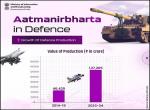Recently in Guwahati, the capital of Assam, a seventeen-year old girl accompanied by a male friend was accosted by a mob and for almost half an hour subjected to molestation, including physical assault, sexual molestation, disrobing and worse. There were a number of people on the street, not one of whom intervened. A television crew which filmed the incident did not try to stop the violence. Only four persons out of a mob of over forty have so far been arrested and there is no account of their being roughly handled by the police at the time of arrest. I am not for a minute suggesting that the police should take the law into its own hands, but when people who behave like barbarians are apprehended I am sure they would not come along quietly like lambs to the slaughter and, therefore, the police would be justified in using force when arresting such people. However, I suppose that is reserved for peaceful people indulging in a nonviolent public agitation against some unpopular administrative action. Earlier two persons who went to the rescue of a girl in Mumbai who was being molested by some goondas were murdered. Apparently more than two hundred people were present but no one came to the rescue of the victims.
Increasingly one finds that resort to violence by the strong against the weak is being witnessed throughout India and this is equally true of rural areas as it is of urban areas. This violence takes many forms. For example, attacks on dalits are a frequent feature in States such as Uttar Pradesh and Bihar, with Madhya Pradesh and Maharashtra not lagging far behind. In Narsimhapur District of Madhya Pradesh and Sangrur District of Punjab there is a systematic boycott of scheduled castes by intermediate and upper castes in which there is insistence that the scheduled castes work for the other castes as farm labourers or in traditional occupations such as flaying of dead animals or working as a cobbler at a wage to be dictated by the upper castes. We have on the statute book the Scheduled Castes and Scheduled Tribes (Prevention of Atrocities) Act, just as we have the Civil Rights Act, the Indian Penal Code and the Constitution itself which debars any form of discrimination. These laws are meant to protect those who are too weak to help themselves and if the authorities were to use these laws a great deal of the social injustice now meted out to the weak could be prevented and the perpetrators could be punished. In Narsimhapur the district administration has been lethargic and in Sangrur the Deputy Commissioner has said that he has worked out a compromise formula which both parties have accepted. The dalits deny this and state that they were forced by the police to give affidavits to the effect that they now have no complaints. When Parliament enacted the protective laws it mandated enforcement of the laws and did not speak about any questionable compromise. An offence has been committed and it must be investigated and the criminals prosecuted. Why has it not been done?
In Haryana and Western U.P. various communities, but in particular the Jats, hold community council meetings called Khap Panchayats. In one such panchayat the community decided that no females below the age of forty may visit the market to make purchases; women, in particular young girls, may not possess or use a mobile telephone and no love marriages will take place within the community because that pollutes the culture of the community. Many Khap Panchayat has converted themselves into courts, even sentenced to death and executed couples whose marriage the panchayat did not accept and has forced people to go into exile. These are acts of murder, criminal intimidation and worse. The law does not state that if these acts are done by a Khap Panchayat they will be deemed to be legal. The police should have registered cases, vigourously pursued them and brought the criminals to justice. The police response has been extremely weak because government, in conspiracy with the Khap Panchayats, does not want enforcement of laws. Can twenty-first century India live with this situation in which a group of people illegally takes on the mantle of both judge and executioner and then proceeds to give a decision which results in murder? Can we expect such people to have any respect for law?
There is a superb piece of legislation called The Bonded Labour (Abolition) Act which is extremely well drafted, has clear definitions of what constitutes bondage in labour, provides for the freeing of bonded labour and empowers the executive magistracy to summarily try cases of persons holding bonded labour and handing down sentences upto three years of rigorous imprisonment and fine. My own experience was that when Arjun Singh was Chief Minister of Madhya Pradesh in 1984 I was summoned to the cabinet and asked whether in Bilaspur Division I had posted Inspectors for enforcement of the Act. Sixteen young officers had been posted by me and because they had not yet been exposed to the temptation of bribery or the pressure of political intervention these officers were active in their duty. I was told by the Chief Minister that the officers were harassing the cultivators. I pointed to five of his ministers from Bilaspur Division who were present in the cabinet and had been booked for keeping bonded labour. The Chief Minister wanted me to informally instruct the Inspectors to go slow in their work, which was tantamount to saying that they should ignore cases of bonded labour. I refused to do this because both the Chief Minister and I had sworn an oath to uphold the law and, therefore, I could not ask my officers to ignore it. My other argument was that in one case out of ten the officers would follow my instructions and in the other nine cases they would take a bribe to overlook wrongdoing. I was not prepared to accept such a situation. The Chief Minister said that my obstinacy would result in agriculture being adversely affected. I volunteered to prepare a draft letter from the Chief Minister to the Prime Minister giving the view of the State Government that the Act was not in the interest of agriculturists at large and, therefore, it should be repealed. A horrified Arjun Singh told me that this must not be done because after all the Bonded Labour (Abolition) Act was a fine piece of social legislation. On this I really blew my top and told the Chief Minister that he had opened the way for a complete contempt for law in Madhya Pradesh. A person who could keep bonded labour with impunity could then ask the worker to send him his wife for a night of pleasure and if the worker refused he could assault or even kill him knowing that nothing would happen to him. My view is that either we should not have a law on the statute book or, if it is there, then not give any officer at any level the discretion to enforce it or not. Law making is the prerogative of Parliament and the State Legislature, but in its enforcement the Executive must strictly follow the mandate of the Legislature and not discriminate in the matter of implementation. Unfortunately law enforcement is very sketchy in India and this, in turn, has greatly encouraged corruption.
When I joined the Service in 1957 we were told never to pass a prohibitory order under section 144 Cr.P.C unless the situation becomes uncontrollable without such an order. If, however, an order had been given under section 144 Cr.P.C it must be enforced rigidly, with no exception so that people knew that the magistracy meant business. I followed this advice up to the last day of my service. We were also told that when there is an emerging law and order situation Minor Acts must be enforced rigidly so that an environment could be built up in which people realise that violation of law would invite penalty. In January, 1960 I was posted as SDO and SDM, Waraseoni in Balaghat District. That was the time when communal violence on a large scale erupted in Jabalpur in what is known as the Usha Bhargava case. At that time the strength of the police in a normal rural police station was one Sub Inspector, two Head Constables and six Constables and the jurisdiction covered more than a hundred villages. Waraseoni, the sub divisional headquarter was a town of about thirty thousand people and the police station had a strength of one Sub Inspector, one Assistant Sub Inspector, three Head Constables and twenty-four Constables. It also had fifty or sixty villages under its jurisdiction. The senior most police officer was a Circle Inspector, because there was no Sub Divisional Officer, Police and the district itself had, apart from the Superintendent of Police, only one Deputy Superintendent of Police. With such a small Force and a volatile situation I had only a few options available to me. I ordered the CI to post two Constables at the bus stand and let no one from Jabalpur alight in Waraseoni as I did not want trouble makers from that city to enter my sub-division. I commandeered four or five vehicles, ordered their flaps to be lowered and secured and in each one of them I put one armed constable in the driver’s cab. These vehicles were then asked to patrol the town continuously. There were never more than five policemen on such patrol duty but the impression given was that five vehicle loads of policemen were on the prowl. I also told the police to rigidly enforce section 34 of the Indian Police Act whereby every act of nuisance, including public urination, throwing of a banana peel in the street, even spitting led to immediate arrest. The arrested persons were brought to the police station and made to squat there for three or four hours. Towards the end of the day a Magistrate visited the police station, fined each person a couple of rupees and released them. However, throughout the town the word spread that if you as much as spat in public you would be arrested. Imagine what would happen if someone indulged in an act of violence, arson or looting. The administration would come down heavily on such people like a ton of coals. In such an environment people were scared of violating the law and we were able to maintain complete peace in a time of trouble.
Today who enforces the law? Traffic lights are run with impunity; two-wheeler drivers refuse to wear the mandatory helmet, people park at will and do not use a seat belt when driving a motor vehicle. Shopkeepers intrude on public space without fear. The strong dominate the weak. On St. Valentine’s Day goons from the Bajrang Dal go around beating up young couples and vandalising restaurants and shops. Extortion rules the market and criminals with political patronage overawe the police. Let alone the Minor Acts, even the Indian Penal Code is not enforced as a hapless police, emasculated by political intervention, stands by as an onlooker only. The general climate is one of total contempt for law and, therefore, a seventeen-year old female child could be molested in public in Guwahati with no one lifting a finger to save her. It is like being in the court of the Kauravas with no Krishna to help Draupadi when she was being forcefully disrobed. One of the consequences of the increasing contempt for law is organised crime on an unprecedented scale. I absolutely refuse to believe that people such as Dawood Ibrahim could not only prosper but become one of the biggest gang lords in the world without the active connivance of the Maharashtra Police in the city of Mumbai, or the growing disillusionment with law keeping in that city which makes the citizens indifferent to the crimes that they were witnessing daily. How could they not be indifferent when every day they see the lawlessness of the Shiv Sena which tries to violently impose its agenda of narrow mindedness on the basically cosmopolitan city of Mumbai? If the Police could stand by doing nothing when the Shiv Sena was riding high, why should it not stand by as a spectator when Dawood Ibrahim was riding high? In fact Davood Ibrahim was prepared to bribe the police which the Shiv Sena would not do and, therefore, why should the police fight the source of profit? The breakdown of order has resulted in corrupting even such a fine Police Force as that which has been the pride of Mumbai.
The weakness of the State in law enforcement has given birth to widespread insurgency in the North-East, in the Punjab, in Jammu & Kashmir and now in what is called the Red Corridor consisting of about 160 districts which have passed into the control of extreme Left Wing Naxalites. Even today the government’s response is extremely weak partially because it does not have will to restore order, partially because extremists are able to mobilise fringe neo-liberal elements to attack the police and the administration and project that the present government is an oppressor and partially because our elected representatives have turned away from law making and overseeing law enforcement and have become both the agents and the beneficiaries of corruption. In such a situation let us try and understand what is happening to the police. In 1861 through a very fine piece of legislation, the Indian Police Act, the British organised a disciplined, unified, trained Police Force whose job is to maintain order, enforce the law, prevent crime, investigate offences and bring the criminals to justice, to collect intelligence which could help in the maintenance of public order and take measures to ensure that public streets and public places are kept free of obstruction and are available to citizens going about their lawful business. Superintendence over the Force vests in the government but administration of the Force vests in the Inspector General of Police. The law does not permit anyone to interfere with the administration of the police or the performance of its lawful functions. Unfortunately by purely illegal means government has increasingly interfered in the administration of the Force and politicians, criminal elements and others have daily tried to make the police deviate from performing its duty of maintaining order and preventing and detecting crime. Every time the Police fails to act against an infraction of law or it acts in a biased manner under pressure the law is weakened, respect for law decreases and law-abiding citizens are put to risk by the activities of law breakers. Cumulatively it leads to break down of law and order and renders government itself ineffective.
Is the situation lost for ever? On the night of June 25th-26th ,1975, when the Emergency was declared, orders went out to the police to take into custody persons or members of organisations designated in the order. The same Police Force which was considered ineffective, when given clear-cut directives, completed its task in just four hours. The Emergency was a horrible episode in our history but it did prove that if the administration had a clear-cut direction it could enforce order and the people would obey. Surprisingly during the period of Emergency there were very few riots and very few cases of police firing. Criminals and law breakers were afraid of law, a situation which had not prevailed since 1947. What the Emergency proved was not that the Executive Magistracy and the police have become permanently ineffective but rather it is lack of direction which has caused these agencies to deviate. In order to make the law enforcement agencies effective we do not need an Emergency. What we need is a political leadership which is committed to providing good government to India. For this purpose the leadership should be prepared to empower the Police and the Executive Magistracy and to stand by them when they take action. Government must at the same time build up an accountability machinery which ensures that wayward acts of the police are immediately reacted to and public confidence in the good behaviour of the Police is restored without delay. An empowered, accountable Police Force is the best shield against violence and law breaking and, therefore, without going into the merits of what the Supreme Court has said from time to time on Prakash Singh’s writ petition, the Police is permitted to perform its law enforcement functions, is protected against malicious complaints and is brought to account both for non-performance and mal-performance. If that happens and the Police becomes both active and proactive in a people friendly manner, within one year we can restore law and order to this country. That also requires that the citizens begin to respect the law, not only out of fear of punishment but because a society bound by laws benefits all, especially those who are too weak to look after themselves. Government must show a political will to lead the country to an environment in which the law counts.
Published Date: 18th July 2012










Post new comment